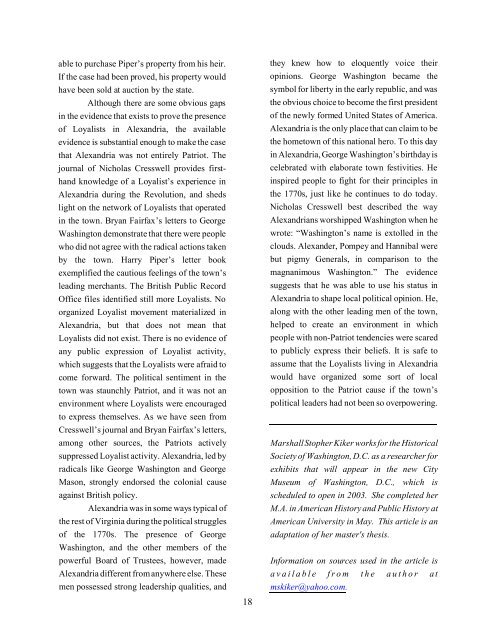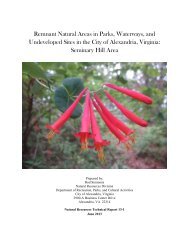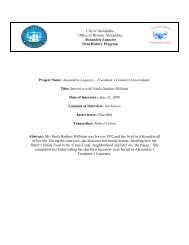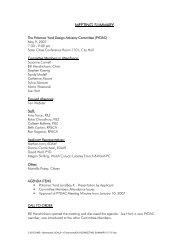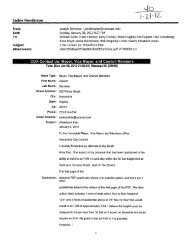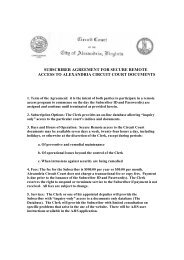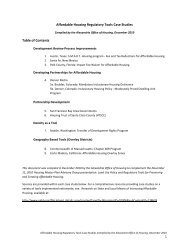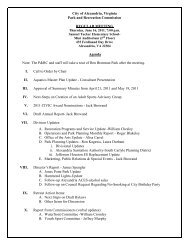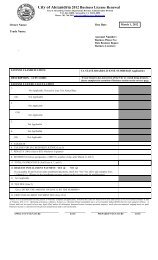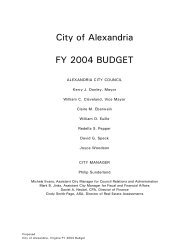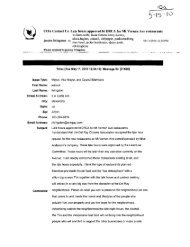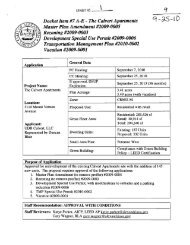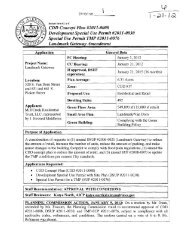LOYALISM IN EIGHTEENTH CENTURY ... - City of Alexandria
LOYALISM IN EIGHTEENTH CENTURY ... - City of Alexandria
LOYALISM IN EIGHTEENTH CENTURY ... - City of Alexandria
Create successful ePaper yourself
Turn your PDF publications into a flip-book with our unique Google optimized e-Paper software.
able to purchase Piper’s property from his heir.<br />
If the case had been proved, his property would<br />
have been sold at auction by the state.<br />
Although there are some obvious gaps<br />
in the evidence that exists to prove the presence<br />
<strong>of</strong> Loyalists in <strong>Alexandria</strong>, the available<br />
evidence is substantial enough to make the case<br />
that <strong>Alexandria</strong> was not entirely Patriot. The<br />
journal <strong>of</strong> Nicholas Cresswell provides first-<br />
hand knowledge <strong>of</strong> a Loyalist’s experience in<br />
<strong>Alexandria</strong> during the Revolution, and sheds<br />
light on the network <strong>of</strong> Loyalists that operated<br />
in the town. Bryan Fairfax’s letters to George<br />
Washington demonstrate that there were people<br />
who did not agree with the radical actions taken<br />
by the town. Harry Piper’s letter book<br />
exemplified the cautious feelings <strong>of</strong> the town’s<br />
leading merchants. The British Public Record<br />
Office files identified still more Loyalists. No<br />
organized Loyalist movement materialized in<br />
<strong>Alexandria</strong>, but that does not mean that<br />
Loyalists did not exist. There is no evidence <strong>of</strong><br />
any public expression <strong>of</strong> Loyalist activity,<br />
which suggests that the Loyalists were afraid to<br />
come forward. The political sentiment in the<br />
town was staunchly Patriot, and it was not an<br />
environment where Loyalists were encouraged<br />
to express themselves. As we have seen from<br />
Cresswell’s journal and Bryan Fairfax’s letters,<br />
among other sources, the Patriots actively<br />
suppressed Loyalist activity. <strong>Alexandria</strong>, led by<br />
radicals like George Washington and George<br />
Mason, strongly endorsed the colonial cause<br />
against British policy.<br />
<strong>Alexandria</strong> was in some ways typical <strong>of</strong><br />
the rest <strong>of</strong> Virginia during the political struggles<br />
<strong>of</strong> the 1770s. The presence <strong>of</strong> George<br />
Washington, and the other members <strong>of</strong> the<br />
powerful Board <strong>of</strong> Trustees, however, made<br />
<strong>Alexandria</strong> different from anywhere else. These<br />
men possessed strong leadership qualities, and<br />
18<br />
they knew how to eloquently voice their<br />
opinions. George Washington became the<br />
symbol for liberty in the early republic, and was<br />
the obvious choice to become the first president<br />
<strong>of</strong> the newly formed United States <strong>of</strong> America.<br />
<strong>Alexandria</strong> is the only place that can claim to be<br />
the hometown <strong>of</strong> this national hero. To this day<br />
in <strong>Alexandria</strong>, George Washington’s birthday is<br />
celebrated with elaborate town festivities. He<br />
inspired people to fight for their principles in<br />
the 1770s, just like he continues to do today.<br />
Nicholas Cresswell best described the way<br />
<strong>Alexandria</strong>ns worshipped Washington when he<br />
wrote: “Washington’s name is extolled in the<br />
clouds. Alexander, Pompey and Hannibal were<br />
but pigmy Generals, in comparison to the<br />
magnanimous Washington.” The evidence<br />
suggests that he was able to use his status in<br />
<strong>Alexandria</strong> to shape local political opinion. He,<br />
along with the other leading men <strong>of</strong> the town,<br />
helped to create an environment in which<br />
people with non-Patriot tendencies were scared<br />
to publicly express their beliefs. It is safe to<br />
assume that the Loyalists living in <strong>Alexandria</strong><br />
would have organized some sort <strong>of</strong> local<br />
opposition to the Patriot cause if the town’s<br />
political leaders had not been so overpowering.<br />
Marshall Stopher Kiker works for the Historical<br />
Society <strong>of</strong> Washington, D.C. as a researcher for<br />
exhibits that will appear in the new <strong>City</strong><br />
Museum <strong>of</strong> Washington, D.C., which is<br />
scheduled to open in 2003. She completed her<br />
M.A. in American History and Public History at<br />
American University in May. This article is an<br />
adaptation <strong>of</strong> her master's thesis.<br />
Information on sources used in the article is<br />
available from the author at<br />
mskiker@yahoo.com.


